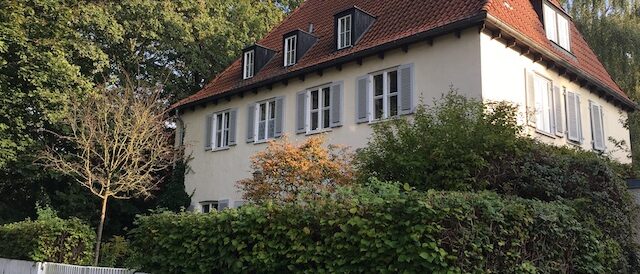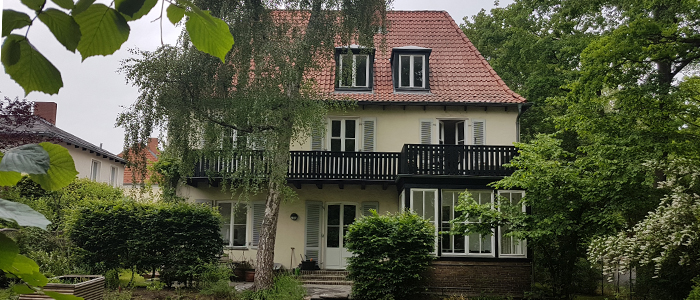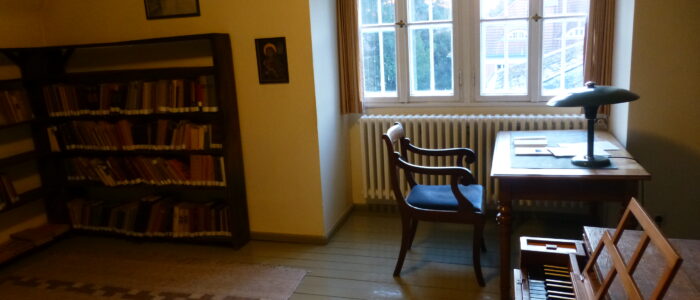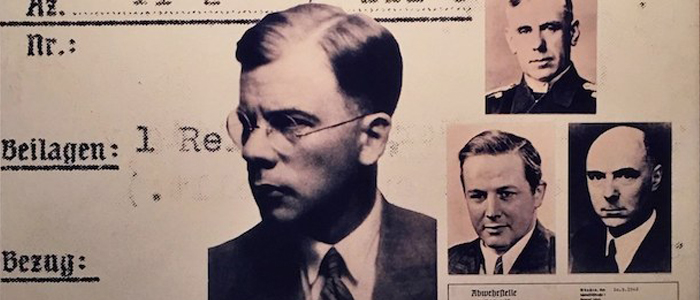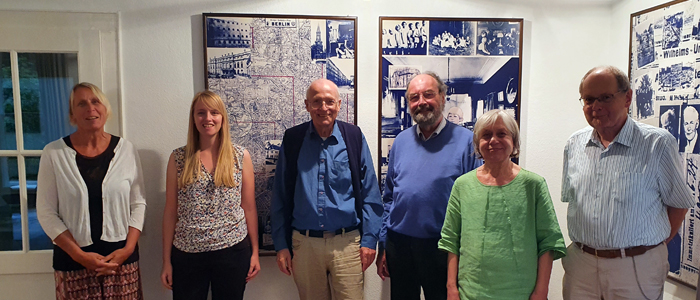Statutes of the Association „BONHOEFFER-HOUSE Memorial and Place of Encounter“
Statutes of the Bonhoeffer House Memorial and Meeting Center dated February 21, 2017, in the version dated July 23, 2018
Statutes of the association „Bonhoeffer-Haus e.V.“ Memorial and Meeting Place with the addition of Section 3, Paragraph 4 by the General Assembly on July 23, 2018
Preamble
Dietrich Bonhoeffer has lived in the former home of the family of Karl and Paula Bonhoeffer in Berlin-Charlottenburg, Marienburger Allee 43, since 1935. Parts of his „ethics“ were created here. Talks of the resistance against National Socialism took place here. From this house, Dietrich Bonhoeffer was arrested by the Gestapo on April 5, 1943. Since June 1, 1987, the Bonhoeffer House with the reconstructed study of Dietrich-Bonhoeffer and a permanent exhibition on his life and work has been a church memorial and meeting place. From July 1, 2017, the Bonhoeffer House will be operated by the association to be founded with the agreement of these statutes as a church work of the Evangelical Church Berlin-Brandenburg-Silesian Upper Lusatia.
§ 1 Name, seat, business year
(1) The association bears the name “Bonhoeffer House Memorial and Meeting Place” and is to be entered in the register of associations; after the entry it has the addition „e.V.“.
(2) It has its seat in Berlin.
(3) The business year is the calendar year.
(4) When the association is founded, it initially arises as a non-incorporated association. With entry in the register of associations, it transforms into a registered association. The first fiscal year is a short fiscal year; it ends on December 31. of the year of registration.
§ 2 Aims and tasks of the association
(1) The association promotes the education of adults and young people by remembering the resistance under National Socialism using the example of the theologian Dietrich Bonhoeffer and his family. His Christian witness, his theological work and his ecumenical and political commitment are to be recognized. The work takes place in cooperation with the memorial and remembrance work of the Evangelical Church Berlin-Brandenburg-Silesian Upper Lusatia.
(2) The association achieves its goals in particular through the operation of the Bonhoeffer-Haus memorial and meeting place from July 1st, 2017. Details on the transfer of use of the property and the building are regulated by an agreement between the Evangelical Church Berlin-Brandenburg-Silesian Upper Lusatia and the association.
(3) The house is open to individual guests and groups of visitors from church and society, especially guests from the ecumenical movement, who want to deal with his life and work as well as its significance in the past and present in accordance with the concerns of the institution at Dietrich Bonhoeffer’s place of residence.
§ 3 tax relief
(1) The association pursues exclusively and directly charitable purposes within the meaning of the section “tax-privileged purposes” of the tax code. The association is selflessly active; it does not primarily pursue economic purposes.
(2) Funds of the association may only be used for statutory purposes. The members do not receive payments from the association. No person may benefit from expenses that are alien to the purposes of the association or from disproportionately high remuneration.
(3) The provisions of the preceding paragraph remain unaffected by the possibility of the association to pay an appropriate amount of remuneration or allowances for expenses for services rendered (in particular for the implementation of tours and events in the memorial and meeting place). This applies to third parties not belonging to the association as well as to association members.
(4) The provisions of Paragraph 2 do not affect the possibility of paying members of the Board of Management appropriate remuneration for their work. The general assembly decides on the amount of the remuneration.
§ 4 Ecclesiastical institution of the Evangelical Church Berlin-Brandenburg-Silesian Upper Lusatia
The association is an expression of life and essence of the church and recognized as a church work of the Evangelical Church Berlin-Brandenburg-Silesian Upper Lusatia within the meaning of Article 94 Paragraph 2 of the Basic Order of the Evangelical Church Berlin-Brandenburg-Silesian Upper Lusatia.
§ 5 Membership
(1) All natural and legal persons who support the goals of the association can become members. The board decides on the written application. There is no entitlement to admission.
(2) There are two forms of membership: active membership with voting rights and sustaining membership, which – with the exception of voting rights – is associated with the same rights, in particular participation in general meetings.
(3) The resignation of a member takes place by means of a written declaration to a member of the board with a period of three months at the end of the financial year. A member can be expelled by resolution of the board if he acts contrary to the goals of the association or does not meet his obligations towards the association. The member can appeal against the decision to the general assembly. This makes the final decision. The member is to be invited to the meeting and to be heard.
(4) The general assembly decides on the amount of the annual contributions. This can be done in the form of a contribution regulation.
§ 6 Organs of the association
(1) The organs of the association are the board of directors and the general assembly.
(2) Membership in the board means membership in a for the Working Group of Christian Churches in the Federal Republic of Germany. V. or a church belonging to the World Council of Churches, usually membership in a member church of the Evangelical Church in Germany.
(3) An advisory council can be formed by resolution of the general assembly or the board of directors.
§ 7 Board of Directors
(1) The board has four to seven members. 1. The General Superintendent of the Sprengels Berlin is a born member qua office. 2. The International Dietrich Bonhoeffer Society, German-speaking Section, e.V. sends a member as a board member for a period of six years. 3. The other members are elected by the general assembly. The term of office of the elected members is six years. Before the election, the general assembly determines the number of board members to be elected. If an elected member of the board resigns during the term of office, the general assembly elects a substitute member for the remaining term of office of the resigned member at its next meeting. 4. The members remain in office until they are re-elected or newly appointed. Re-election and renewed posting are possible.
(2) The members of the board of directors require confirmation by the church leadership of the Evangelical Church Berlin-Brandenburg-Silesian Upper Lusatia.
(3) The board of directors appoints one of its members as chairperson and one as deputy chairperson or deputy chairperson.
(4) The chairperson or the deputy usually invites the board to a meeting twice a year. The members should receive the invitation at least 14 days before the meeting. This can also be done electronically (e.g. by email).
(5) The board decides by resolution. The board has a quorum if at least half of the members are present. When voting, the majority of the votes cast decides; Abstentions and invalid votes do not count as votes cast. In a tie the motion is rejected.
(6) Resolutions can also be passed outside of board meetings in writing, by fax or electronically (especially by email). However, they can only come into effect if at least half of the board members take part in the vote and no board member has objected to the announcement of the resolution by circulation procedure.
§ 8 Tasks of the board of directors
(1)The board of directors is responsible for accompanying the content-related work.
(2) The board of directors is responsible for all affairs of the association, unless they are assigned to the general assembly by the statutes. Its main tasks are: 1. Management of the house of the memorial and meeting place, in particular proper management and maintenance of the house and property, 2. Decision on the event program of the association or the memorial and meeting place, 3. Decision on the admission and exclusion of members, 4. Invitation to the general meeting, drawing up the agenda and chairing the general meeting, 5. Preparation and execution of the resolutions of the general assembly, 6. Preparation of the budget for each financial year and the accounting, 7. Adoption of the annual report, 8. Appointment and dismissal of the managing director and supervision of the management.
(3) The board of directors can appoint a managing director. The managing director does not have to be a member of the association. In this context, the managing director can also be granted legal power of attorney. The board of directors can regulate further details in rules of procedure for the management.
(4) The board of directors can issue rules of procedure.
§ 9 Managing Director
If the Board of Directors appoints a managing director, he or she will conduct the day-to-day business in accordance with the guidelines set out in the rules of procedure. He or she is responsible to the Board of Directors and bound by its instructions.
§ 10 General Assembly
(1) Each active member has one vote in the General Assembly. Another member can be authorized in writing to exercise voting rights. No member may exercise more than his or her own right to vote.
(2) The general assembly is responsible for the following matters: 1. Receipt of the annual report, approval of the annual financial statements, discharge of the board of directors; 2. Decision on the collection and the amount of a membership fee; this can also be done in the form of a contribution system. 3. Election and removal of members of the Board of Directors. 4. Appointment of a cash auditor. These can, but do not have to be, members of the Executive Board. Re-election is possible. 5. Resolution on changes to the statutes and on the dissolution of the association; This requires the approval of the church leadership of the Evangelical Church Berlin-Brandenburg-Silesian Upper Lusatia.
(3) In matters that fall within the area of responsibility of the board, the general assembly can resolve recommendations. For its part, the board of directors can obtain the opinion of the general assembly.
§ 11 Convocation of the general meeting
(1) The ordinary general meeting takes place at least once a year. It is convened in writing by the Executive Board with a notice period of two weeks, stating the agenda. The period begins on the day following the sending of the invitation letter. The invitation can be sent electronically e.g. B. by email. The letter of invitation is deemed to have been received by the member if it is sent to the last address given to the association in writing by the member. The board of directors sets the agenda.
(2) The board of directors can call an extraordinary general meeting at any time. This must be convened if the interests of the association so require or if the convening of a tenth of all voting members is requested in writing by the board stating the purpose and the reasons. Paragraph 1 sentences 2 to 4 apply accordingly.
§ 12 Resolutions of the General Assembly
(1) The General Assembly is chaired by a member of the Executive Board, who is determined by the latter. In the case of elections, the chairmanship of the meeting can be transferred to another member for the duration of the ballot and the preceding discussion. The general assembly is not public. The member in charge of the assembly can admit guests.
(2) The general assembly has a quorum if at least one third of all voting members are present or effectively represented. In the event of a quorum, the board is obliged to call a second general meeting with the same agenda within eight weeks; this has a quorum regardless of the number of members present. This must be pointed out in the invitation.
(3) The general assembly decides by resolution. When voting, the majority of the votes cast decides; Abstentions and invalid votes do not count as votes cast. In a tie the motion is rejected. However, a majority of three quarters of the votes cast is required to change the statutes, and a majority of four fifths to dissolve the association.
(4) A majority of the members present is required for elections. If this majority is not achieved, a new election must be made between the two who received most of the votes cast. In the third ballot, the person who receives the most of the votes cast is elected; in the event of a tie, the lot decides. If several people are to be elected, the general assembly can decide before the start of the voting that only one ballot should take place. In this case, those who have received most of the votes cast are elected in the order of the number of votes; In the event of a tie, a runoff election takes place; if the runoff election is unsuccessful, the lot decides. It should contain the following statements: place and time of the meeting, the names of the members named in sentence 1, the number of members present, the agenda, the individual voting results and the type of voting. In the case of amendments to the statutes, the exact wording must be given.
(6) Every resolution on the amendment of the articles of association must be submitted to the responsible tax office before it is registered with the registry court.
§ 13 Representation of the association
The association is represented in and out of court by the chairperson or the deputy chairperson as well as another member of the board. The managing director is authorized to represent the association within the framework of the power of attorney granted to him or her.
§ 14 Dissolution of the association
In the event of dissolution or the loss of tax-privileged purposes, the assets of the association go to the Evangelical Church Berlin-Brandenburg-Silesian Upper Lusatia, which must use them directly and exclusively for charitable and church purposes within the meaning of these statutes.
§ 15 Coming into force
These statutes come into force with their adoption. February 21, 2017 Marienburger Allee 43, 14055 Berlin
Founding members:
Ulrike Trautwein
Martina Dethloff
Ralf Herold
Dr. Christian Löhr
Ingrid Portmann
Dr. Tobias Korenke
Dr. Konrad Raiser
Jeffrey Seeck
Dr. Michael Börgers
Gottfried Brezger
